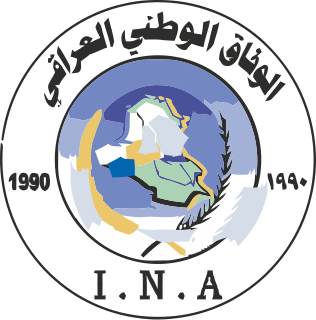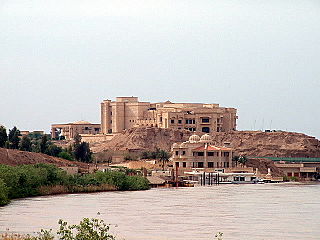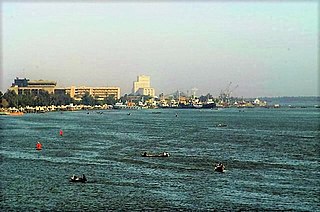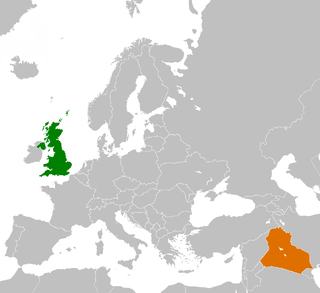
The Iraqi National Accord, known inside Iraq as Wifaq, is an Iraqi political party founded by Iyad Allawi, Tahsin Muallah and Salah Omar al-Ali in 1991.

Tikrit sometimes transliterated as Takrit or Tekrit, is a city in Iraq, located 140 kilometres (87 mi) northwest of Baghdad and 220 kilometres (140 mi) southeast of Mosul on the Tigris River. It is the administrative center of the Saladin Governorate. As of 2012, it had a population of 160,000.

Basra Governorate is a governorate in southern Iraq, bordering Kuwait to the south and Iran to the east. The capital is the city of Basra. Other districts of Basra include Al-Qurnah, Az Zubayr, Al Midaina, Shatt Al Arab, Abu Al Khaseeb and Al Faw located on the Persian Gulf.

The Victory Arch, officially known as the Swords of Qādisīyah، and popularly called the Hands of Victory or the Crossed Swords, are a pair of triumphal arches in central Baghdad, Iraq. Each arch consists of a pair of outstretched hands holding crossed swords. The two arches mark the two entrances to Grand Festivities Square and the parade ground constructed to commemorate the Iran–Iraq War, led by then Iraqi President Saddam Hussein. The arches were opened to the public on 8 August, 1989. It is one of Baghdad's visitor attractions and near to The Monument to the Unknown Soldier.
Raghad Hussein is a daughter of Saddam Hussein, the former president of Iraq.

Amarah (Arabic: العمارة Al ‘Amārah}, also spelled Amara, is a city in south-eastern Iraq, located on a low ridge next to the Tigris River waterway south of Baghdad about 50 km from the border with Iran. It lies at the northern tip of the marshlands between the Tigris and Euphrates.
The Central Bank of Iraq (CBI) is the central bank of Iraq.

The Invasion of Kuwait on 2 August 1990 was a two-day operation conducted by Iraq against the neighboring State of Kuwait, which resulted in the seven-month-long Iraqi occupation of the country. This invasion and Iraq's subsequent refusal to withdraw from Kuwait by a deadline mandated by the United Nations led to military intervention by a United Nations-authorized coalition of forces led by the United States. These events came to be known as the first Gulf War and resulted in the expulsion of Iraqi forces from Kuwait and the Iraqis setting 600 Kuwaiti oil wells on fire during their retreat.

The Iraqi Navy (IqN) is one of the components of the military of Iraq. Its primary responsibilities are the protection of Iraq's coastline and offshore assets. Initially called the Iraqi Coastal Defense Force, its official name was changed on 12 January 2005.

The 1991 uprisings in Iraq were a series of popular rebellions in northern and southern Iraq in March and April 1991 in a ceasefire of the Persian Gulf War. The mostly uncoordinated insurgency, often referred to as the Sha'aban Intifada among Arabs and as the National Uprising among Kurds, was fueled by the perception that then Iraqi President Saddam Hussein was responsible for systemic social repression and had become vulnerable to regime change. This perception of weakness was largely the result of the outcome of two prior wars: the Iran–Iraq War and the invasion of Kuwait, both of which occurred within a single decade and devastated the economy and population of Iraq.

The Battle of Basra lasted from 21 March to 6 April 2003 and was one of the first battles of the 2003 invasion of Iraq. The British 7 Armoured Brigade fought their way into Iraq's second-largest city, Basra, on 6 April coming under constant attack by the Iraqi Army 51st Division and Fedayeen. While elements of the Parachute Regiment cleared the 'old quarter' of the city that was inaccessible to vehicles. Entering Basra had only been achieved after two weeks of conflict, which included the biggest tank battle of the war by British forces when the Royal Scots Dragoon Guards destroyed 14 Iraqi tanks on the 27 March.

British–Iraqi relations are foreign relations between Iraq and the United Kingdom.

The Siege of UK bases in Basra was conducted and maintained by the Mahdi Army in Basra for most of 2007. Following the reported success of the coalition Operation Sinbad, whose purpose was to stabilise Basra and prepare it for the turning over of security to Iraqi government forces, the city was overrun by insurgent forces from three different militia forces, including the Mahdi Army, and the British found themselves under siege in their bases and capable of conducting only limited raids in armoured convoys into the city.

The bilateral relations between the Republic of Iraq and the Republic of India have traditionally been friendly and collaborative. Cultural interaction and economic trade between Indus Valley and Mesopotamia date back to 1800 BCE. The 1952 Treaty of Friendship established and strengthened ties between contemporary India and Iraq. By the 1970s, Iraq was regarded as one of India's closest allies in the Middle East.

Iraqi–Italian relations are the interstate ties relations between Iraq and Italy. Iraq has an embassy in Rome and Italy has an embassy in Baghdad and a consulate-general in Basra.

Iraqi nationalism is a form of nationalism which asserts the belief that Iraqis are a nation and promotes the cultural unity of Iraqis. Iraqi nationalism involves the recognition of an Iraqi identity stemming from ancient Mesopotamia including its civilizations of Babylonia and Assyria. Iraqi nationalism influenced Iraq's movement for independence from Ottoman and British occupation. Iraqi nationalism was an important factor in the 1920 Revolution against British occupation, and the 1958 Revolution against the British-installed Hashemite monarchy.
The following is a timeline of the history of the city of Basra, Iraq.
Alia Muhammad Baker was the chief librarian in the Al Basrah Central Library, Basra, Iraq. Baker saved an estimated 30,000 books from destruction during the Iraq War, including a biography of Muhammad from around 1300.

Lamia Al-Gailani Werr was an Iraqi archaeologist specialising in ancient Mesopotamian antiquities.



















